人教版八年级上英语各单元必考知识点汇编
人教版八年级英语上册各单元知识要点

人教版八年级英语上册各单元知识要点Unit 1When is your birthday?1. 询问生日的方式:- When is your birthday?- My birthday is on (具体日期) + (月份) (ordinal numeral)th.- It's on the (具体日期) + (月份) (ordinal numeral)th.2. 表达年龄的方式:- How old are you?- I am (年龄) years old.Unit 2How often do you exercise?1. 表达频率的副词:- always 总是- often 经常- usually 通常- sometimes 有时候- rarely 很少- never 从不2. 频率副词在句子中的位置:- 常用于be动词、助动词或情态动词之后,行为动词之前。
Unit 3Why do you like koalas?1. 表达喜欢或不喜欢的方式:- Why do you like/don't like + 名词?- Because they are (形容词).- Because they are (形容词) + and (形容词).Unit 4What's the best movie theater?1. 表达最高级的方式:- What's + the + 形容词最高级 + 名词 (单数) ?- What's + the + most/least + 形容词 + 名词 (复数) ?Unit 5Do you want to watch a game show?1. 表达想要做某事的方式:- Do you want to + 动词原形 + 名词?- Sure./Yes, I do./No, I don't.2. 表达对某事感兴趣的方式:- Are you interested in + 名词/动名词?- Yes, I am./No, I'm not.Unit 6I'm going to study computer science.1. 表达将来计划、打算要做某事的方式:- I'm going to + 动词原形.- I'm + (具体时间) + going to + 动词原形.2. 表达将来计划、打算要做某事的原因:- Why are you going to + 动词原形?- Because + 原因.Unit 7Will people have robots?1. 表达将来会发生的事情:- Will + 主语 + 动词原形?- Yes, 主语 + will./No, 主语 + won't.2. 表达对将来的预测和想法:- I think + 将来的情况 + (will) + 结果.- Maybe + 将来的情况 + will + 结果.Unit 8How do you make a banana milk shake?1. 描述烹饪步骤的连词:首先,第一,接下来,然后,最后2. 描述烹饪步骤的动词:- peel 削皮- chop 切碎- blend 搅拌- pour 倒- mix 混合- serve 上菜Unit 9How was your weekend?1. 询问周末活动的方式:- How was your weekend?- What did you do on the weekend?2. 描述周末活动的过去式:- I (动词过去式) + (具体活动).Unit 10Where did you go on vacation? 1. 询问度假地点的方式:- Where did you go on vacation?- I went to (具体度假地点).2. 描述度假活动的过去式:- I (动词过去式) + (具体活动) on vacation.以上是人教版八年级英语上册各单元的知识要点,通过灵活运用这些表达方式和句型结构,可以更加流利地进行英语交流。
人教版八年级上册英语必考知识点汇总
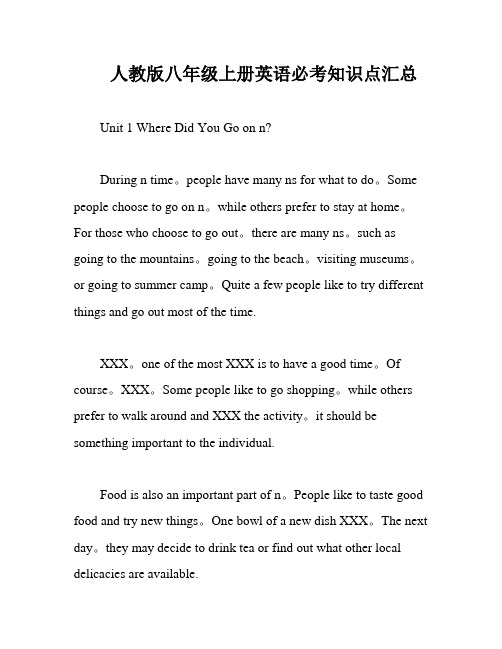
人教版八年级上册英语必考知识点汇总Unit 1 Where Did You Go on n?During n time。
people have many ns for what to do。
Some people choose to go on n。
while others prefer to stay at home。
For those who choose to go out。
there are many ns。
such as going to the mountains。
going to the beach。
visiting museums。
or going to summer camp。
Quite a few people like to try different things and go out most of the time.XXX。
one of the most XXX is to have a good time。
Of course。
XXX。
Some people like to go shopping。
while others prefer to walk around and XXX the activity。
it should be something important to the individual.Food is also an important part of n。
People like to taste good food and try new things。
One bowl of a new dish XXX。
The next day。
they may decide to drink tea or find out what other local delicacies are available.Taking photos is a great way to capture memories of the n。
人教版八年级英语上册知识点总结和复习要点
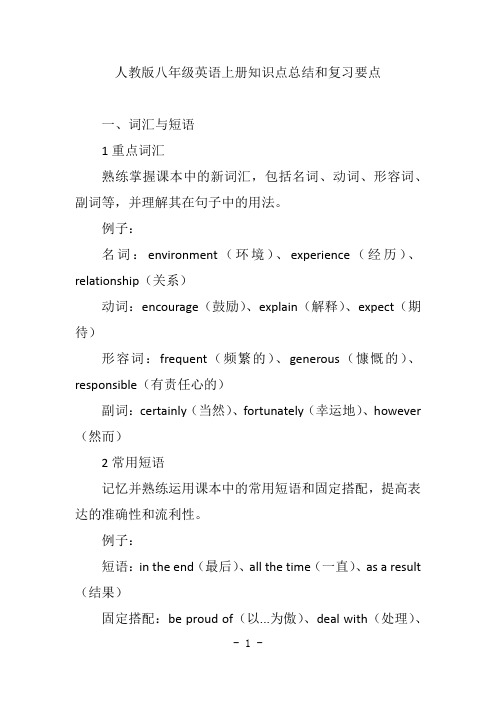
人教版八年级英语上册知识点总结和复习要点一、词汇与短语1重点词汇熟练掌握课本中的新词汇,包括名词、动词、形容词、副词等,并理解其在句子中的用法。
例子:名词:environment(环境)、experience(经历)、relationship(关系)动词:encourage(鼓励)、explain(解释)、expect(期待)形容词:frequent(频繁的)、generous(慷慨的)、responsible(有责任心的)副词:certainly(当然)、fortunately(幸运地)、however (然而)2常用短语记忆并熟练运用课本中的常用短语和固定搭配,提高表达的准确性和流利性。
例子:短语:in the end(最后)、all the time(一直)、as a result (结果)固定搭配:be proud of(以...为傲)、deal with(处理)、pay attention to(注意)二、句型与语法1基本句型熟练掌握五种基本句型,包括主语+谓语、主语+谓语+宾语、主语+谓语+间接宾语+直接宾语、主语+谓语+宾语+宾语补足语、主语+系动词+表语。
例子:主语+谓语:She sings.(她唱歌。
)主语+谓语+宾语:I like apples.(我喜欢苹果。
)主语+谓语+间接宾语+直接宾语:He gave me a book.(他给了我一本书。
)主语+谓语+宾语+宾语补足语:I found the book interesting.(我发现这本书很有趣。
)主语+系动词+表语:She is beautiful.(她很漂亮。
)2时态深入学习并掌握现在完成时、过去进行时、一般将来时、过去将来时等时态的用法和形式。
例子:现在完成时:I have already seen that movie.(我已经看过那部电影了。
)过去进行时:They were playing football when I called them.(我打电话给他们时,他们正在踢足球。
人教版八年级英语上册1-5单元知识点(词汇+句型+固定搭配)
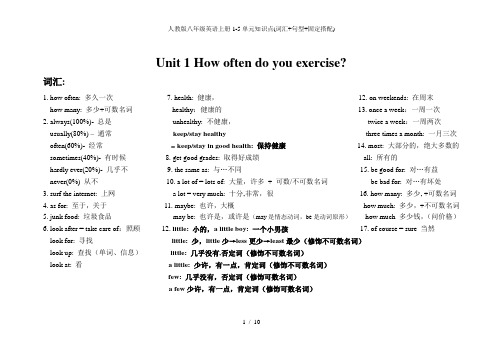
Unit 1 How often do you exercise?词汇:1. how often: 多久一次7. health: 健康,12. on weekends: 在周末how many: 多少+可数名词healthy:健康的13. once a week:一周一次2. always(100%)- 总是unhealthy: 不健康,twice a week:一周两次usually(80%) –通常keep/stay healthy three times a month: 一月三次often(60%)- 经常= keep/stay in good health: 保持健康14. most: 大部分的,绝大多数的sometimes(40%)- 有时候8. get good grades: 取得好成绩all: 所有的hardly ever(20%)- 几乎不9. the same as: 与…不同15. be good for: 对…有益never(0%) 从不10. a lot of = lots of: 大量,许多+ 可数/不可数名词be bad for: 对…有坏处3. surf the internet: 上网 a lot = very much: 十分,非常,很16. how many: 多少, +可数名词4. as for: 至于,关于11. maybe: 也许,大概how much: 多少,+不可数名词5. junk food: 垃圾食品may be: 也许是,或许是(may是情态动词,be是动词原形)how much 多少钱,(问价格)6. look after = take care of:照顾12. little: 小的,a little boy: 一个小男孩17. of course = sure 当然look for: 寻找little: 少,little少→less更少→least最少(修饰不可数名词)look up: 查找(单词、信息)little: 几乎没有,否定词(修饰不可数名词)look at: 看 a little: 少许,有一点,肯定词(修饰不可数名词)few: 几乎没有,否定词(修饰可数名词)a few少许,有一点,肯定词(修饰可数名词)1 / 10句型:1.How often do you exercise? →I exercise three times a week. How often does she shop? →She shops once a month.2.What do you usually do on weekends? →I usually watch TV. How often does she watch TV? →She watches TV everyday.3.How many hours do you sleep every night? 你每晚睡几个小时?→I sleep nine hours every night.How many books do you have? 你有多少本书?→I have 5 books.How much is the sweater? 这件毛衣多少钱?How much water do you have? 你有多少水?(how much: 多少,后面+不可数名词, water是不可数名词)4.What’s your favorite program? 你最喜欢的电视节目是什么?→It’s Animal World.固定搭配:try to do sth.: 尽力做某事,设法做某事try doing sth.: 试着做、尝试做某事help sb. (to) do sth: 帮助某人做某事(to可以省略)want sb. to do sth.: 想要某人做某事2 / 10Unit 2 What’s the matter?词汇:1. have a cold 感冒9. few: 几乎没有,否定词(修饰可数名词)have a fever 发烧 a few少许,有一点,肯定词(修饰不可数名词)have a stomachache 肚子痛little: 几乎没有,否定词(修饰不可数名词)have a headache 头疼 a little: 少许,有一点,肯定词(修饰不可数名词)have a toothache 牙齿疼10. at the moment = now 现在,此刻have a sore throat 喉咙疼11. host family 寄宿家庭have a sore back 背部酸疼12. not…until…直到……时候才……2. lie down and have a good rest 躺下好好休息13. should 应该,情态动词,后+动词原形3. hot tea with honey 加了蜂蜜的热茶should not=shouldn’t4. ill 病了的illness 疾病14. see a doctor 看医生5. advice 建议(不可数名词)see a dentist 看牙医some advice(不能加”s”) 15. too many太多…,修饰可数名词too many students6. be stressed out 有压力的,紧张的too much太多…,修饰不可数名词too much yin7. balance 平衡balanced 平衡的much too 太……,much too big 太大a balanced diet 平衡的饮食16. stay=keep 保持on a diet 节食keep/stay healthy8. get 变得= keep/stay in good health: 保持健康get angry 变得生气get tired 变得劳累3 / 10句型:1. What’s the matter with you? = What’s the trouble with you? = What’s wrong with you? 你怎么了?→I have a cold/ have a toothache/ have a sore throat….2. Wha t’s the matter? →She has a cold.3. Does he have a cold? →Yes, he does.4. A: What’s the matter?B: I’m not feeling well.(此处不能用good) I have a cold.A: When did it start?B: About two days ago.A: That’s too bad. You should drink lots of water.B: Yes, I think so.A: I hope you feel / get better soon. 我希望你尽快好起来5. A: I have a coldB: I am sorry to hear that. (当听到对方不好的消息时使用此句)固定搭配:It is + 形容词+ (for sb.) to do sth. 做某事对某人来说是………的例句:It is easy for me to learn (learn) English. 对我来说学英语是容易的It is interesting to watch (watch) Animal World. 看动物世界时有趣的4 / 10Unit 3 What are you doing for vacation?→→→本单元用现在进行时态表示将来的事情现在进行时态,即be + doing:词汇:1. go camping 去野营 6. a lot = very much 十分、非常、很2. A: What are you doing for vacation? go fishing 去钓鱼 a lot of = lots of 许多、大量B: I am going camping.go shopping 去购物7. away 向远处、离开A: That sounds nice.go swimming 去游泳go away 离开Who are you going with?go hiking 去远足B: I am going with my parents.go bike riding 去骑单车8. stay: 留、停留、呆go sightseeing 去观光旅游 3. Linda is going to Tibet next summer. (划线提问)2. how long 多久、多长时间句型:→Where is Linda going next summer?3. get back 回来get back to school 1. What are you doing for vacation?4. He’s going on the 12th. (划线提问)4. be famous for…以……而闻名→I am visiting my grandparents. →When is he going?5. leave for…离开去……地方What is your brother doing for vacation?leave →(过去式) left →He is going camping. 5. I’m staying there for a week. (划线提问)left: 左边、离开→How long are you staying?5 / 106.当听到对方提出的建议,如:What about playing basketball? How about taking a walk with me? Why not go to the movie? 为什么不去看电影?I am going camping.等句子时,回答可用以下句型:That sounds nice/ good/ interesting/. That’s a good idea. / Good idea. That sounds like a good idea./ Great等.7.当听到对方要去旅行或是准备出行时,如:I am going to Hongkong for a week. I am going hiking in the mountains.时,回答一般用以下句型:Have a good time!8.询问天气:How is the weather? 或是What’s the weather like?9.询问某人的职业:What do you do? What are you? What’s your job? 你的工作是什么?What does your mother do? What is he? 他是干什么的?10.询问某人的性格:What are you like? →I am outgoing/ shy/ quiet.What is he like? 他是个什么样的人?→He is outgoing/ shy/ quiet. 他很外向/害羞/安静10. 询问某人长的什么样子:What does he look like? 他长的什么样子?→He is of medium build/height. 他中等身材/身高.What does your father look like? →He is tall. 他很高11. 询问某人喜欢什么:What do you like? 你喜欢什么?→I like basketball. 我喜欢篮球固定搭配:1.finish doing sth 完成做某件事例:I finished doing my homework. 我完成了我的家庭作业6 / 10Unit 1-3 单元课本语法知识& 在讲解畅优新课堂时补充的语法知识点与固定搭配:1.情态动词后+动词原形(do)已学情态动词:can 能够, must 必须, should 应该, may 也许. would 想,会help sb (to) do sth 帮助某人做某事2. 介词后若接动词,则接动词的ing形式:常见的:what about + doing sth? 做………怎么样?常接doing的固定搭配:1. like doing sth 喜欢做某事2. enjoy doing sth 享受做某事3. have a good/ have fun in doing sth 做某事玩的很开心4. finish doing sth 完成做某件事5. spend +(时间、金钱、精力) doing sth 花时间、金钱、精力做某事= spend +(时间、金钱、精力) on sth3. 不定式,即:to do常接不定式的固定搭配:want sb to do sth 想要某人做某事would like to do sth 想做某事tell sb to do sth 告诉某人做某事ask sb to do sth 要求某人做某事plan to do sth 计划做某事decide to do sth 决定做某事need to do sth 需要做某事forget to do sth 忘记做某事try to do sth 尽力做某事4. 不定代词+ 形容词结构例:something interesting 一些有趣的事情7 / 10Unit 4 How do you get to school?词汇:1. get to: 到达arrive at: 到达+ 小地点(学校、医院…)arrive in: 到达+ 大地点(城市、国家、地区…)reach: 到达2. take the bus = by bus:坐公交车8. how long: 多久,how far:多远13. take…to…把…带到…3. take the train = by train:坐火车9. from…to…从…到…14. from: 离…的距离4. take the subway = by subway:坐地铁10. think of: 认为think about: 考虑15. not all: 不是所有5. ride one’s bike = by bike:骑单车11. around the world = all over the world: 全世界6. walk = on foot:走路12. be different from: 与…不同16. more…than…:比…更…,than: 比7. depend on: 视……而定,决定于……,依靠……17.other 其他的,形容词18. than 比others 其他的人或其他的事19. more…than…比……更……,形容词比较级的用法the other 两者中的另一个,单数概念the others 两部分中的另一部分,复数概念another 另外一个,另外的,第三个的8 / 10句型:1. How do you get to school? →I take the bus. / I go to school by bus.How does she get to school? →She takes the bus. / She goes to school by bus.2. How long does it take?→It takes about/around 10 minutes. →It takes about 25 minutes to walk and 10 minutes by bus. How long does it take you to get from home to school? →It takes 25 minutes.3. How far is it from your home to school? →It’s 3 miles./10 kilometers.4. What do you think of………? = how do you like……? 你认为……怎么样?5. How far do you live from school?你住的离学校有多远→I live 10 miles from school.6. Can I help you? May I help you? →Yes, please.固定搭配:1.It takes sb. + 时间+ to do sth. 例句:It takes me 20 minutes to walk (walk)2.need to do sth. 需要做某事3.more…than…比……更……,形容词比较级的用法4 形容词的比较级&最高级:规则变化:比较级:形容词尾+“er”,最高级:+“est ”,例:big →bigger →the biggest不规则变化:三个音节及以上的形容词(比较长的形容词),比较级:前面+ more, 最高级:前面+most,例:popular 流行的→more popular更流行的→the most popular 最流行的最高级前面+“the”例:This classroom is bigger than that one. 这件教室比那间大This classroom is the biggest. 这间教室是最大的9 / 10Unit 5 Can you come to my party?词汇:1. other 其他的The other 另一个(两个中的另一个) 9. have to 不得不,要…The others 另一部分(两部分中的另一部分)10. babysit= look after = take care of = care for 关心,照顾Another 另外的,另一个(三个以上中的另一个)2. the day before yesterday 前天句型:yesterday 昨天 1. Can you come to my party?today 今天Yes, I’d love to.(肯定回答)tomorrow 明天I’m sorry, I can’t. I have to……(否定回答)the day after tomorrow 后天 2. What’s today? 今天星期几,几号?(星期、日期都可以问) 3. on weekends 在周末It’s Monday the 14th. 今天14号星期一。
人教版八年级英语上册知识点总结(最新最全)
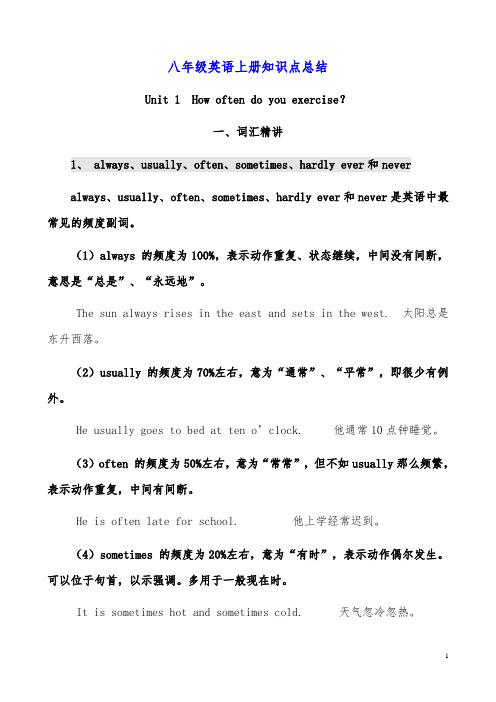
八年级英语上册知识点总结Unit 1 How often do you exercise?一、词汇精讲1、 always、usually、often、sometimes、hardly ever和neveralways、usually、often、sometimes、hardly ever和never是英语中最常见的频度副词。
(1)always 的频度为100%,表示动作重复、状态继续,中间没有间断,意思是“总是”、“永远地”。
The sun always rises in the east and sets in the west. 太阳总是东升西落。
(2)usually 的频度为70%左右,意为“通常”、“平常”,即很少有例外。
He usually goes to bed at ten o’clock. 他通常10点钟睡觉。
(3)often 的频度为50%左右,意为“常常”,但不如usually那么频繁,表示动作重复,中间有间断。
He is often late for school. 他上学经常迟到。
(4)sometimes 的频度为20%左右,意为“有时”,表示动作偶尔发生。
可以位于句首,以示强调。
多用于一般现在时。
It is sometimes hot and sometimes cold. 天气忽冷忽热。
Sometimes he does it this way and sometimes he does it that way.他有时这样做,有时那样做。
(5)hardly ever 的频度为5%左右,意为“几乎不”、“偶尔”,表频率,位置是“行前be后”。
I hardly ever go out these days. 这些天我几乎不出门。
(6)never 的频度为0,意为“从来不”、“永不”。
My parents are never late for work. 我父母上班从来不迟到。
人教版英语:八年级上册各单元必考知识点汇总

人教版英语:八年级上册各单元必考知识点汇总Unit1 Where did you go on vacation?【重点语法】不定代词:不指名代替任何特定名词或形容词的代词叫做不定代词。
用法注意:1. some和any +可数名/不可数名。
some多用于肯定句,any多用于否定句、疑问句和条件从句。
有些问句中用some,不用any,问话者希望得到对方肯定回答。
2.由some, any, no, every与body, one, thing构成的复合不定代词作主语时,其谓语动词用三单。
3.不定代词若有定语修饰,该定语要置于其后:如:somethinginteresting【重点短语】1. buy XXX为某人买某物2. taste + adj.尝起来……3. nothing...but + V.(真相)除……以外甚么都没有4. seem + (to be) + adj看起来5. XXX抵达某地6. XXX do XXX决定做某事7. try doing sth.测验考试做某事/ try to do sth.极力做某事8. XXX喜欢做某事9. want to do sth.想去做某事10. XXX.入手下手做某事=XXX.11. stop XXX截止做某事辨别:stop to do sth.停下往来来往做某事12.XXX XXX.不喜欢做某事14.so + adj + that +从句如此……以至于……16. tell sb. (not) to do sth.告诉某人(不要)做某事17. keep XXX继续做某事18. forget to do XXX.忘记去做某事XXX忘记做过某事【词语辨析】1.XXX拍照quite a few+名词复数“很多…”2. seem +描绘词看起来…... You seem happy today.XXX.似乎/好像做某事I seem to have a coldIt seems +从句似乎..….It XXX.seem like ...好像,似乎…..It seems like a good idea.XXX小地址(注:若后跟地点副词XXX,介词需省略,如:arrive here;get home)4. XXX感觉像…XXX.想要做某事5. wonder(想知道)+疑问词(who, what, why)引导的从句。
(完整版)人教版八年级英语上册各单元知识点归纳和作文范文

新课标八年级上册英语单元知识点归纳Unit1 Where did you go on vacation?短语归纳1.go on vacation去度假2.stay at home待在家里3.go to the mountains去爬山4.go to the beach去海滩5.visit museums 参观博物馆6.go to summer camp去参加夏令营7.quite a few相当多8.study for tests为测验而学习9.go out出去10.most of the time大部分时间11.have a good time doing=have fun doing =enjoy oneself玩得高兴12.of course=sure =certainly当然13.feel like给……的感觉;感受到14.go shopping去购物15.in the past在过去16.walk around四处走走17.because of+名词短语:因为because+句子18. a/one bowl of…一碗……19. the next day第二天20.drink tea喝茶21.find out找出;查明22.go on继续23.take photos照相24.something important重要的事25.up and down上上下下e up出来come out 出版发行27.go out with anyone 跟别人出去28.say about 发表对…看法29.rain hard 雨下得大30.too much+不可数名词太多too many+可数名词复数太多much too+形容词太用法:1.buy sth. for sb. / buy sb. sth.为某人买某物2.taste / look/sound/smell good. 尝起来/看起来/听起来/闻起来不错3.nothing…but+动词原形除了……之外什么都没有4.seem+(to be)+ adj. 看起来……5.arrive in+大地点/ arrive at+小地点/get to +地点/reach +地点到达某地6.decide to do sth.决定去做某事7.try doing sth.尝试做某事/ try to do sth.尽力去做某事8.forget doing sth.忘记做过某事/ forget to do sth.忘记做某事9.enjoy doing sth.喜欢做某事10. want to do sth.想去做某事11.start doing sth.开始做某事12.stop doing sth. 停止做某事13.dislike doing sth. 不喜欢做某事14.keep doing sth.继续做某事keep on doing sth 不停做某事15.Why not do. sth.=why don’t you do sth为什么不做……呢?16.so+adj.+that+从句如此……以至于……17.tell sb. (not) to do sth. 告诉某人(不要)做某事18.enough +名词,形容词+enough19.not really .真的没有。
新人教版初中英语八年级上册知识总结(最全)
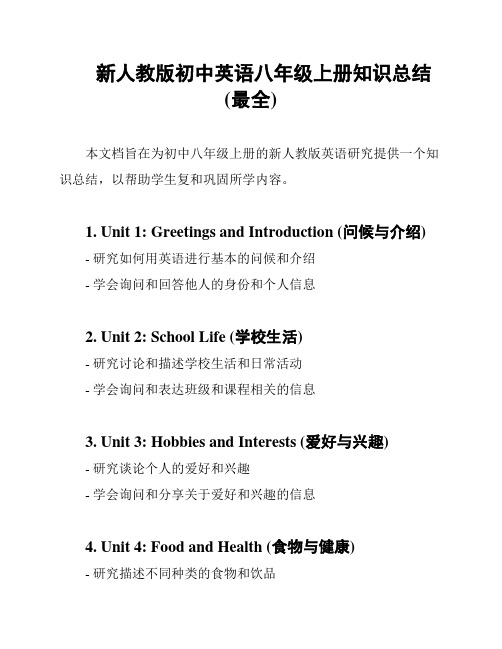
新人教版初中英语八年级上册知识总结(最全)本文档旨在为初中八年级上册的新人教版英语研究提供一个知识总结,以帮助学生复和巩固所学内容。
1. Unit 1: Greetings and Introduction (问候与介绍)- 研究如何用英语进行基本的问候和介绍- 学会询问和回答他人的身份和个人信息2. Unit 2: School Life (学校生活)- 研究讨论和描述学校生活和日常活动- 学会询问和表达班级和课程相关的信息3. Unit 3: Hobbies and Interests (爱好与兴趣)- 研究谈论个人的爱好和兴趣- 学会询问和分享关于爱好和兴趣的信息4. Unit 4: Food and Health (食物与健康)- 研究描述不同种类的食物和饮品- 学会提醒他人注意饮食健康和生活惯5. Unit 5: Festivals and Celebrations (节日与庆祝) - 研究讨论和描述各种节日和庆祝活动- 学会询问和分享关于节日和庆祝的信息6. Unit 6: Travel and Transportation (旅行与交通) - 研究谈论旅行和交通方式- 学会询问和表达关于旅行和交通的信息7. Unit 7: Daily Routines (日常作息)- 研究讨论和描述日常作息和活动安排- 学会询问和分享关于日常作息的信息8. Unit 8: Environmental Protection (环境保护)- 研究讨论和描述环境保护的重要性和方法- 学会提醒他人关于环境保护的意识和行动本文档总结了新人教版初中英语八年级上册所有单元的核心内容。
希望这个总结能帮助同学们回顾和巩固所学的知识,以便更好地应对考试和实际应用。
人教版八年级英语上册知识点总结(全)
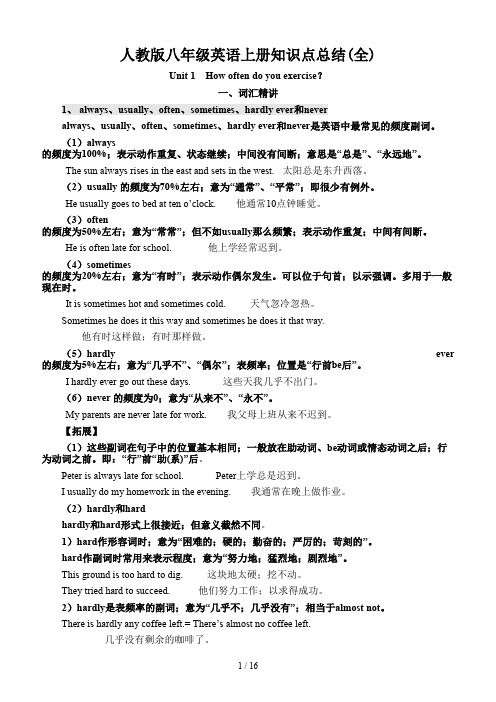
人教版八年级英语上册知识点总结(全)Unit 1 How often do you exercise?一、词汇精讲1、 always、usually、often、sometimes、hardly ever和neveralways、usually、often、sometimes、hardly ever和never是英语中最常见的频度副词。
(1)always的频度为100%;表示动作重复、状态继续;中间没有间断;意思是“总是”、“永远地”。
The sun always rises in the east and sets in the west. 太阳总是东升西落。
(2)usually 的频度为70%左右;意为“通常”、“平常”;即很少有例外。
He usually goes to bed at ten o’clock. 他通常10点钟睡觉。
(3)often的频度为50%左右;意为“常常”;但不如usually那么频繁;表示动作重复;中间有间断。
He is often late for school. 他上学经常迟到。
(4)sometimes的频度为20%左右;意为“有时”;表示动作偶尔发生。
可以位于句首;以示强调。
多用于一般现在时。
It is sometimes hot and sometimes cold. 天气忽冷忽热。
Sometimes he does it this way and sometimes he does it that way.他有时这样做;有时那样做。
(5)hardly ever 的频度为5%左右;意为“几乎不”、“偶尔”;表频率;位置是“行前be后”。
I hardly ever go out these days. 这些天我几乎不出门。
(6)never 的频度为0;意为“从来不”、“永不”。
My parents are never late for work. 我父母上班从来不迟到。
新人教版八年级上册英语全册期末复习必背知识点归纳
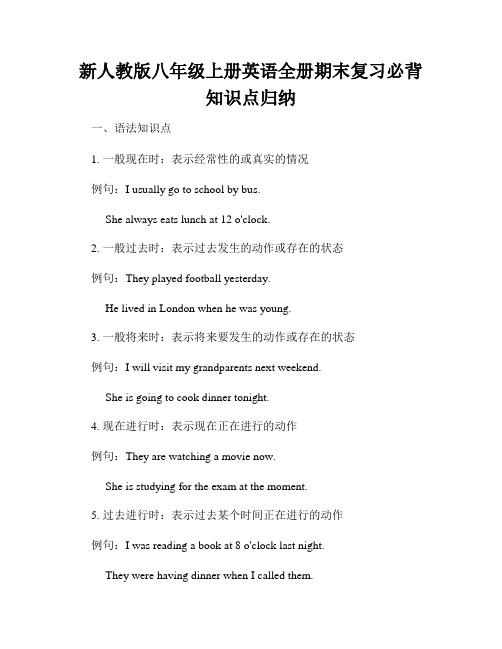
新人教版八年级上册英语全册期末复习必背知识点归纳一、语法知识点1. 一般现在时:表示经常性的或真实的情况例句:I usually go to school by bus.She always eats lunch at 12 o'clock.2. 一般过去时:表示过去发生的动作或存在的状态例句:They played football yesterday.He lived in London when he was young.3. 一般将来时:表示将来要发生的动作或存在的状态例句:I will visit my grandparents next weekend.She is going to cook dinner tonight.4. 现在进行时:表示现在正在进行的动作例句:They are watching a movie now.She is studying for the exam at the moment.5. 过去进行时:表示过去某个时间正在进行的动作例句:I was reading a book at 8 o'clock last night.They were having dinner when I called them.6. 情态动词 can 和 could:表示能力或许可例句:I can swim very well.He could speak three languages when he was young. 7. 情态动词 must 和 have to:表示义务、必须或强制性例句:You must finish your homework before going out.I have to wake up early tomorrow.8. 情态动词 should:表示建议或应该例句:You should eat more vegetables for better health. She should go to bed early for enough sleep.9. 动词不定式:表示目的、原因、结果或时态等例句:I went to the supermarket to buy some fruits.She is happy to hear the good news.二、词汇知识点1. 人称代词:用于代替特定人或物例句:He is my brother.They are good friends.2. 数词:表示数量的词语例句:There are ten students in the classroom.I have two cats and three dogs.3. 形容词:修饰名词或代词,描述人或物的特征例句:She is a beautiful girl.This is a big house.4. 副词:修饰动词、形容词、副词等,表示时间、地点、程度等例句:She runs fast.He speaks English fluently.5. 介词:介绍名词与其他词语之间的关系例句:I have a pen in my bag.The book is on the table.6. 连词:连接句子、词组或单词例句:I like swimming and playing basketball.She can play the guitar or the piano.7. 冠词:用于限定名词例句:I have an apple.The book on the table is mine.三、题型解析1. 完形填空题:根据上下文意思,选出合适的单词填空Tom: What's your favorite ________?Emily: I like watching ________.Tom: Me too. Let's go to the ________ tonight.A. colorB. movieC. sportD. book答案:B2. 阅读理解题:阅读短文,回答相关问题例题:My name is Lucy. I am twelve years old. I ________ to school every day. My favorite ________ is English. I like playing basketball ________ school. My dream is to become a ________ in the future.What does Lucy like playing?A. basketballB. soccerC. tennisD. volleyball答案:A3. 选择填空题:选择合适的单词或短语填空例题:Lucy: What's your ________ food, Tom?Tom: I like ________ because it tastes delicious.A. favoriteB. leastC. difficultD. easy4. 任务型阅读题:根据文章内容,完成相应的任务例题:请你根据短文内容,回答以下问题:What is the main idea of the passage?答案:The passage is about Lucy's daily life and her dream.四、写作技巧1. 写作时要注意使用适当的句式和词汇,使文章更加丰富多样。
人教版八年级英语上册各单元知识点汇总

人教版八年级英语上册各单元知识点汇总UNIT 1 Where did you go on vacation?Section A(1a-3c)重点单词1.anyone pron.任何人2.anywhere adv.在任何地方3.wonderful adj.精彩的;绝妙的4.few adj.& pron.不多;很少5.most adj., adv.& pron.最多;大多数6.something pron.某事;某物7.nothing pron.没有什么;没有一件东西8.everyone pron.每人;人人;所有人9.myself pron.我自己;我本人10.yourself pron.(pl.yourselves)你自己;您自己11.seem v.好像;似乎;看来12.bored adj.厌倦的;烦闷的13.someone pron.某人14.diary n.日记;记事簿15.hen n.母鸡16.pig n.猪词形变换1. wonder—wonderful(形容词)2. I—myself(反身代词)3. you—yourself(你自己)—yourselves(你们自己)4. diary—diaries(复数)5. bore—bored(描述人的形容词)—boring(描述事物的形容词)6. center—central(形容词)7. something—nothing(反义词)—anything(多用于否定句及疑问句)重点短语1. go on vacation 去度假2. quite a few 相当多;不少3. most of the time 大部分时间4. stay at home 待在家里5. go to the beach 去海滩6. take photos 照相7. have a good time 玩得开心8. keep a diary 记日记9. something special 一些特别的事情10. in the countryside 在乡下11. study for tests 备考12. go to the mountains 去爬山13. go shopping 去购物14. buy sth. for sb. 为某人买某物15. taste good/great 尝起来很好16. visit sb. /sp. 拜访某人/参观某地17. go out 出去18. go to summer camp 去夏令营19. of course 当然重点句型1. Long time no see.好久不见。
最全面人教版八年级上册英语各单元知识点总复习归纳总结

人教版八年级上册英语各单元知识点总复习归纳总结目录Unit 1 Where did you go on vacation? (1)一、词汇与短语 (1)二、语法知识点 (3)Unit 2 How often do you exercise? (16)一、词汇与短语 (16)二、语法知识点 (18)Unit 3 I'm more outgoing than my sister. (29)一、词汇与短语 (29)二、语法知识点 (31)Unit 4 What's the best movie theater? (39)一、词汇与短语 (39)二、语法知识点 (40)Unit 5 Do you want to watch a game show? (50)一、词汇与短语 (50)二、语法知识点 (51)Unit 6 I'm going to study computer science. (63)一、词汇与短语 (63)二、语法知识点 (64)Unit 7 Will people have robots? (76)一、词汇与短语 (76)二、语法知识点 (77)Unit 8 How do you make a banana milk shake? (94)一、词汇与短语 (94)二、语法知识点 (95)Unit 9 Can you come to my party? (109)一、词汇与短语 (109)二、语法知识点 (111)Unit 10 If you go to the party, you'll have a great time! (123)一、词汇与短语 (123)二、语法知识点 (124)Unit 1 Where did you go on vacation?一、词汇与短语● 重点单词A部分1.anyone pron. 任何人2.anywhere adv. 在任何地方3.wonderful adj. 精彩的;绝妙的4.few adj. & pron. 不多;很少5.most adj. adv. & pron. 最多;大多数6.something pron. 某事;某物7.nothing pron. 没有什么;没有一件东西8.everyone pron. 每人;人人;所有人9.myself pron. 我自己;我本人10.Yourself pron. 你自己;您自己11.hen n. 母鸡12.pig n. 猪13.seem v. 好像;似乎;看来14.bored adj.厌倦的;烦闷的15.diary n. 日记;记事簿B部分1.enjoyable adj.有乐趣的;令人愉快的2.activity n.活动3.decide v.决定;选定4.try v. 尝试;设法;努力5.paragliding n.滑翔伞运动6.bird n.鸟7.bicycle n.自行车;脚踏车8.building n.建筑物;房子9.trader n.商人10.wonder v.想知道;琢磨11.difference n.差别;差异12.top n.顶部;表面13.wait v.等待;等候14.umbrella n. 伞;雨伞15.wet adj.湿的;潮湿的;下雨的16.below prep. & adv. 在…下面;到…下面17.enough adj. & adv.足够的(地);充足的(地);充分的(地)18.dislike v. & n.不喜爱(的事物);厌恶(的事物)19.as adv.像…样;如同conj.当…时;如同20.hill n.小山;山丘21.duck n.鸭22.hungry adj.饥饿的● 重点短语A部分1.go on vacation 去度假2.stay at home 待在家里3.go to the mountains 去爬山4.go to the beach 去海滩5.visit museums 参观博物馆6.go to summer camp 去参加夏令营7.quite a few 相当多;不少8.study for…为…而学习9.go out 出去10.most of the time 大部分时间11.taste good 尝起来好吃12.have a good time 玩得高兴13.go shopping 去购物14.of course 当然;自然15.buy sth. for sb. /buy sb. sth. 给某人买某物B部分1.arrive in/at 到达2.decide to do sth. 决定去做某事3.try doing sth. 尝试做某事4.forget to do sth. 忘记做某事5.feel like给的感觉;感受到6.in the past 在过去7.wait for 等候8.because of 因为9.the next day 第二天10.take photos 照相11.find out 找出;查明12.up and down 上上下下● 重点句子A部分1.Where did you go on vacation? 你去哪儿度假了?2.Long time no see.好久不见。
新人教版八年级英语上册各单元知识总结归纳
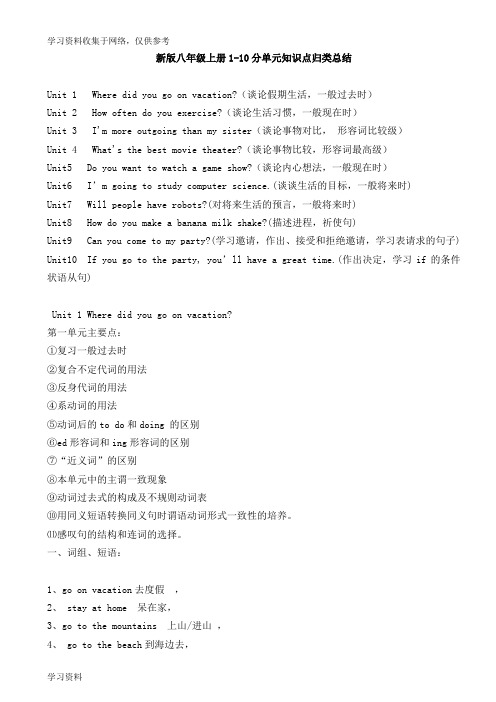
新版八年级上册1-10分单元知识点归类总结Unit 1 Where did you go on vacation?(谈论假期生活,一般过去时)Unit 2 How often do you exercise?(谈论生活习惯,一般现在时)Unit 3 I'm more outgoing than my sister(谈论事物对比,形容词比较级)Unit 4 What's the best movie theater?(谈论事物比较,形容词最高级)Unit5 Do you want to watch a game show?(谈论内心想法,一般现在时)Unit6 I’m going to study computer science.(谈谈生活的目标,一般将来时)Unit7 Will people have robots?(对将来生活的预言,一般将来时)Unit8 How do you make a banana milk shake?(描述进程,祈使句)Unit9 Can you come to my party?(学习邀请,作出、接受和拒绝邀请,学习表请求的句子) Unit10 If you go to the party, you’ll have a great time.(作出决定,学习if的条件状语从句)Unit 1 Where did you go on vacation?第一单元主要点:①复习一般过去时②复合不定代词的用法③反身代词的用法④系动词的用法⑤动词后的to do和doing 的区别⑥ed形容词和ing形容词的区别⑦“近义词”的区别⑧本单元中的主谓一致现象⑨动词过去式的构成及不规则动词表⑩用同义短语转换同义句时谓语动词形式一致性的培养。
⑾感叹句的结构和连词的选择。
一、词组、短语:1、go on vacation去度假,2、 stay at home 呆在家,3、go to the mountains 上山/进山,4、 go to the beach到海边去,5、visit museums 参观博物馆,6、go to summer camp 去夏令营,7、 quite a few 相当多,8、study for为……学习,9、go out 出去,10、most of the time 大部分时间/绝大多数时间,11、taste good 尝起来味道好,12、have a good time玩的开心,13、of course当然可以,14、feel like感觉像……/想要,15、 go shopping购物,16、in the past 在过去,17、walk around绕……走,18、too many 太多(可数名词前面),19、because of 因为,20、one bowl of 一碗……,21、find out 查出来/发现,22、go on继续,23、take photos 照相,24、something important重要的事情,25、up and down上上下下,26、come up出来二、重要句子(语法):Where did you go on vacation?你到哪里去度假了?I went to New York City.我去了纽约城Did you go out with anyone? 你出去带人吗?No, No one was here. Everyone was on vacation.不,没有人在这儿。
人教版英语:八年级上册各单元重难点知识整理

人教版英语:八年级上册各单元重难点知识整理Unit 1: I am looking forward to going to school.- 重点知识:- 类别:Present continuous tense- 用法:表达将来要发生的动作或计划- 难点知识:- 类别:Different ways to express future plans- 用法:研究多种表达未来计划的方式,如be going to, will, want to, hope to, plan to等Unit 2: What should I do?- 重点知识:- 类别:Modal verbs- 用法:情态动词can, could, may, might, should, would, must等的用法及区别- 难点知识:- 类别:Expressing advice or suggestions- 用法:研究如何表达建议或提出建议的方式,如should, could, suggest等Unit 3: Teenagers should be allowed to choose their own clothes.- 重点知识:- 类别:Modal verbs of permission- 用法:情态动词may, can, could, might, allowed to等表达允许或禁止的用法- 难点知识:- 类别:Expressing opinions and arguments- 用法:研究如何表达自己的观点,以及进行辩论和讨论的技巧Unit 4: I used to be afraid of the dark.- 重点知识:- 类别:Used to和be used to的用法- 用法:表达过去的惯或状态,以及适应某种情况的能力- 难点知识:- 类别:Describing past experiences- 用法:研究如何用英语描述过去的经历和事件,如时间状语的运用以及动词的过去式形式Unit 5: It must belong to Carla.- 重点知识:- 类别:Modal verbs of deduction- 用法:情态动词must, might, can't, could等表示推断或猜测的用法- 难点知识:- 类别:Making deductions from clues- 用法:研究如何从线索中推断事物的归属,以及如何用英语表达自己的推论Unit 6: I like music that I can dance to.- 重点知识:- 类别:Defining relative clauses- 用法:用于对前面所指的事物做进一步描述或解释- 难点知识:- 类别:Identifying and describing preferences- 用法:研究如何描述自己的喜好和对事物的评价,以及如何用英语进行描述和表达Unit 7: Would you mind turning down the music?- 重点知识:- 类别:Polite requests and permission- 用法:研究如何礼貌地表达请求和征求许可的方式,如would you mind, could you, may I等- 难点知识:- 类别:Asking for and giving permission- 用法:研究如何询问和给予许可的表达方式,如can, may, is it all right等Unit 8: I will be able to go to all the places I have dreamed of.- 重点知识:- 类别:Future tense (will and be going to)- 用法:研究如何用will和be going to表达将来的动作和计划- 难点知识:- 类别:Expressing dreams and aspirations- 用法:研究如何用英语表达自己的梦想和渴望,以及对未来的展望和期望的表达方式以上是人教版英语八年级上册各单元的重难点知识整理。
人教版八年级上册英语知识点总结

人教版八年级上册英语知识点总结一、语法重点1. 时态- 一般现在时:表示经常发生的动作或状态,以及普遍真理。
- 一般过去时:描述过去发生的动作或状态。
- 现在进行时:表示正在进行的动作。
- 过去进行时:描述过去某一时刻正在进行的动作。
2. 代词- 人称代词主格:I, you, he, she, it, we, they。
- 物主代词:my, your, his, her, its, our, their。
- 反身代词:myself, yourself, himself, herself, itself, ourselves, yourselves, themselves。
3. 介词- 表示时间的介词:at, on, in。
- 表示地点的介词:at, on, in。
- 其他常用介词:with, by, for, from, to, of。
4. 句型结构- 一般疑问句:使用助动词do/does构成。
- 特殊疑问句:使用疑问词who, what, where, when, why, how 等。
- 否定句:使用助动词do/does后跟not。
5. 词汇- 动词短语:take off, turn on/off, get up, go to bed等。
- 形容词和副词:big/large, small, quick/fast, slowly, carefully等。
- 常用名词:student, teacher, school, family, friend等。
二、词汇与短语1. 学校相关词汇- classroom, teacher, student, library, gym, cafeteria。
- subject, lesson, homework, project, test, exam。
2. 家庭与朋友- family, parent, brother, sister, friend, neighbor。
人教版英语八年级上册各单元必考知识点汇总
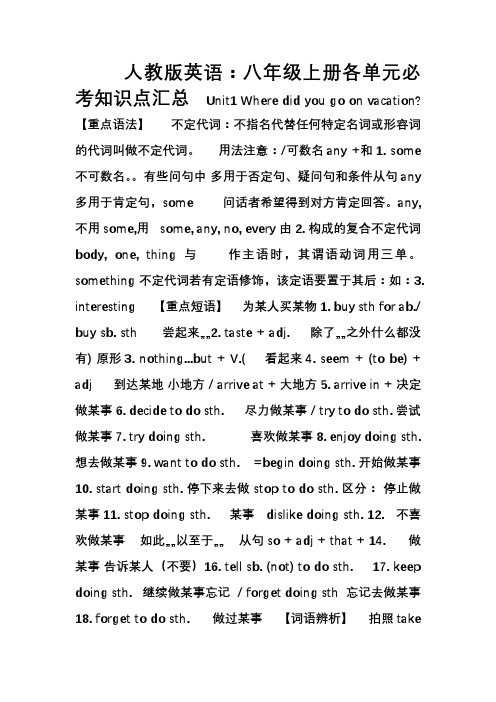
人教版英语:八年级上册各单元必考知识点汇总Unit1 Where did you go on vacation? 【重点语法】不定代词:不指名代替任何特定名词或形容词的代词叫做不定代词。
用法注意:/可数名any +和1. some 不可数名。
有些问句中多用于否定句、疑问句和条件从句any 多用于肯定句,some 问话者希望得到对方肯定回答。
any, 不用some,用some, any, no, every 由2. 构成的复合不定代词body, one, thing与作主语时,其谓语动词用三单。
something 不定代词若有定语修饰,该定语要置于其后:如:3. interesting 【重点短语】为某人买某物1. buy sth for ab./ buy sb. sth 尝起来……2. taste + adj. 除了……之外什么都没有) 原形3. nothing...but + V.( 看起来4. seem + (to be) + adj 到达某地小地方/ arrive at + 大地方5. arrive in + 决定做某事6. decide to do sth. 尽力做某事 / try to do sth. 尝试做某事7. try doing sth. 喜欢做某事8. enjoy doing sth. 想去做某事9. want to do sth. =begin doing sth. 开始做某事10. start doing sth. 停下来去做 stop to do sth. 区分:停止做某事11. stop doing sth. 某事 dislike doing sth. 12. 不喜欢做某事如此……以至于…… 从句so + adj + that + 14. 做某事告诉某人(不要)16. tell sb. (not) to do sth. 17. keep doing sth. 继续做某事忘记 / forget doing sth 忘记去做某事18. forget to do sth. 做过某事【词语辨析】拍照take a photo/ take photos 1.“许多…” 名词复数quite a few+ 看起来…... You seem happy today. 形容词2. seem + I seem to have a cold 好像做某事/似乎seem + to do sth. It seems that no one believe you. 似乎..…. 从句It seems + It seems like a good idea. 好像,似乎….. seem like ... 地点名= get to= reach+大地点3. arrive in + “到达......” 小地点arrive at + arrive here; 介词需省略,如:here/there/home, (注:若后跟地点副词)get home 感觉像…4. feel like sth 想要做某事feel doing sth. 引导的从句。
完整版)人教版八年级英语上册单元知识点归纳

完整版)人教版八年级英语上册单元知识点归纳Unit 1 Where Did You Go on n?In this unit。
we learn some XXX.1.Go on n – to take a n2.Stay at home – to remain at home3.Go to the mountains – to hike in the mountains4.Go to the beach – to spend time at the seaside5.Visit museums – XXX6.Go to summer camp – to attend a summer camp7.Quite a few – a considerable number8.Study for tests – to prepare for exams9.Go out – to leave home10.Most of the time – the majority of the time11.Have a good time doing – to enjoy oneself while doing something12.Of course – certainly13.Feel like – to have a desire for something14.Go shopping – to shop15.In the past – in us times16.Walk around – to strollWe also learn some grammar points:1.Buy sth。
for sb。
/ buy sb。
sth。
– to purchase something for someone2.XXX good – to have a good XXX3.XXX动词原形– nothing except4.Seem+(to be)+adj。
- 1、下载文档前请自行甄别文档内容的完整性,平台不提供额外的编辑、内容补充、找答案等附加服务。
- 2、"仅部分预览"的文档,不可在线预览部分如存在完整性等问题,可反馈申请退款(可完整预览的文档不适用该条件!)。
- 3、如文档侵犯您的权益,请联系客服反馈,我们会尽快为您处理(人工客服工作时间:9:00-18:30)。
Unit1 单元必考知识点1. Did you go with anyone?你和别人去的吗?(课本第2页)【考点】复合不定代词anyone的用法【真题链接】—Can you cook eggs with tomatoes?—Yes, of course. _____ can do it, because it is easy, I think.(湖北孝感)A. AnyoneB. SomeoneC. No oneD. None of us【解析】A. 作答本题时可用联系上下文法。
根据答语的后半句because it is easy“因为这很简单”可知,回答者认为“西红柿炒鸡蛋”这道菜“任何人”都会做,anyone用于肯定句时,意为“任何人”,故选A。
2. Oh, did you go anywhere interesting? 噢,你去什么有趣的地方了吗?(课本第2页)【考点】interesting和interested的用法区别【真题链接】The story is ____ and all of us are _____ in it.(贵州铜仁)A. interest; interestingB. interesting; interestB. interested; interesting D. interesting; interested【解析】interesting和interested的区别:interesting“令人感兴趣的”,常用来修饰或描述事物;interested“对……感兴趣的”,常用来修饰或描述人,其常用搭配为be interested in“对……感兴趣”,故选D。
3. What about you? 你呢?(课本第2页)【考点】What about…? 的用法【真题链接】—What about ____ a rest?—Ok. Let’s go out and have a walk.(湖南长沙)A. to takeB. takesC. taking【解析】What about…? 意为“……怎么样?”,相当于“How about…?”,其后可以接名词、代词或v.-ing形式。
故答案选C。
4. Did everyone have a good time? 大家都玩得高兴吗?(课本第3页)【考点】have a good time的用法【真题链接】—I’ll fly to Qingdao for my holiday this weekend.—Wonderful! _______ (江苏无锡)A. Why not?B. I hope so.C. With pleasureD. Have a good time!【解析】作答本题时可用文化差异法。
按照英语习惯,对于别人的外出旅游或去度假等常表示祝福,故选D项,意为“玩得愉快!”。
5. I arrived in Penang in Malaysia this morning with my family. 今天早上我和家人到达了马来西亚的槟城。
(课本第5页)【考点】词组arrive in 和arrive at的区别【真题链接】Connie arrived _____ the village _____ a snowy night.(广东)A. at; onB. at; inC. in; atD. in; on【解析】A。
从句子结构我们一眼可以看出本题考查的是表达“到达某个地方”时arrive 与介词的搭配和表达具体的某天的上午、下午或晚上时的介词搭配。
因为村庄是小地方,且“arrive at+小地方”。
“arrive in+大地方”,故应用arrive at; 在具体的某天的上午、下午或晚上,用介词on。
6. I wonder what life was like in the past. 我想知道过去这里的生活是怎样的。
(课本第5页)【考点】宾语从句【真题链接】—I think it’s going to be a problem.—Yes, it could be.—I wonder _____ we can do about it.(湖北十堰)A. whatB. howC. ifD. that【解析】A。
作答本题时可用句子结构分析法。
本题wonder后接的宾语从句中,谓语do缺少宾语,而选项中只有引导词what可作宾语,故选A。
how在宾语从句中作状语;if 和that引导宾语从句时,从句中不缺少成分。
7. I really enjoyed walking around the town. 我非常喜欢在这座城市里散步。
(课本第5页)【考点】enjoy后跟动词时的用法【真题链接】We know that she enjoys _____ books very much.(山东滨州)A. readB. readsC. readingD. to read【解析】enjoy意为“享受……的乐趣;欣赏”。
后跟动词作宾语时,动词要用v.-ing 形式,故答案选C。
8. What a difference a day makes! 一天的差异是多么大呀!(课本第5页)【考点】what引导的感叹句【真题链接】—_____ nice day it is today! Let’s g o out to play, shall we? —That’s a good idea. (四川德阳)A. How aB. What aC. How【解析】由本题第一句的句子结构和叹号,可以一眼看出本题考查的是感叹句,而感叹句的中心词为可数名词单数day,应用“What+a/an+形容词+可数名词单数+主语+谓语!”结构,故答案选B。
9. …because we forgot to bring an ______.……因为我们忘了带______。
(课本第6)【考点】“forget to do sth.”和“forget doing sth.”的区别【真题链接】—Don’t forget ____ your homework, John.—OK, I’ll do it right now. (湖南怀化)A. doingB. doC. to do【解析】“forget to do sth.”和“forget doing sth.”的区别为:forget to do sth. 意为“忘记要做某事”,forget doing sth. 意为“忘记做过某事”。
由“I’ll do it right now”可知,还没做家庭作业,故选C。
【直击中考】:Unit2 单元必考知识点1. How often do you watch TV? 你多久看一次电视?(课本第10页)【考点】How often的用法【真题链接】—______ do you go to the movies?—Twice a month. (四川宜宾)A. How oftenB. How farC. How longD. How soon【点拨】作答本题时可用联系上下文法。
本题由答语twice a month“一个月两次”可推出问句提问的是频率,how often“多久一次”,符合题意。
how far提问距离;how long提问时间段;how soon 提问将来的时间段,故答案选A。
2. He plays at least twice a week. 他一周至少踢两次。
(课本第11页)【考点】at least的意思及用法【真题链接】The food I cook isn’t delicious, but ______ I can look after myself.(四川成都)A. at firstB. at lastC. at least【点拨】作答本题可用语义推理法。
本题考查介词短语。
对于三个介词短语的选择,应从语义入手。
句意:我做的食物不美味,但至少我可以照顾自己。
由此推出答案为at least“至少”,故选C。
at first“首先”;at last“最后”。
3. …but we were surprised that ninety percent of them use the Internet every day. ……但是我们对于90%的学生天天上网感到很惊讶。
(课本第13页)【考点】形容词surprised的用法【真题链接】The fans were _____ to know the death of their favorite singing star Whitney Huston. (山东东营)A. gladB. angryC. excitedD. surprised【点拨】作答本题时可用语义推理法。
对于四个形容词的选择,应从语义入手。
句意:歌迷们在得知他们最喜欢的歌星惠特尼·休斯顿去世的消息时,都很吃惊。
由此推出答案为surprise d“惊讶的”,故答案选D。
glad“高兴的”;angry“生气的”;excited“兴奋地”。
4. Although many students like to watch sports, game shows are the most popular. 尽管很多学生喜欢看体育节目,但是竞赛节目是最受欢迎的。
(课本第13页)【考点】although引导的让步状语从句【真题链接】____ the girl is only nine, she takes care of her brothers and cooks meals every day. (江西)A. IfB. BecauseC. AlthoughD. As【点拨】作答本题时可用语义推理法。
对于四个连词的选择,应从语义入手。
句意:尽管这个女孩只有九岁,但是她每天照顾弟弟并做饭。
由此推出答案为although“虽然;尽管”,其引导的是让步状语从句。
5. Exercise such as playing sports is fun, and you can spend time with your friends and family as you play together.像做运动之类的锻炼是很有趣的,并且在你与家人和朋友一起运动的同时,你们可以共享时光。
(课本第13页)【考点】spend的用法【真题链接】—Do you take exercise every day?—Yes. I always ____ thirty minutes walking after supper. (内蒙古呼和浩特)A. spendB. takeC. costD. pay【点拨】作答根本题时可用直观法。
